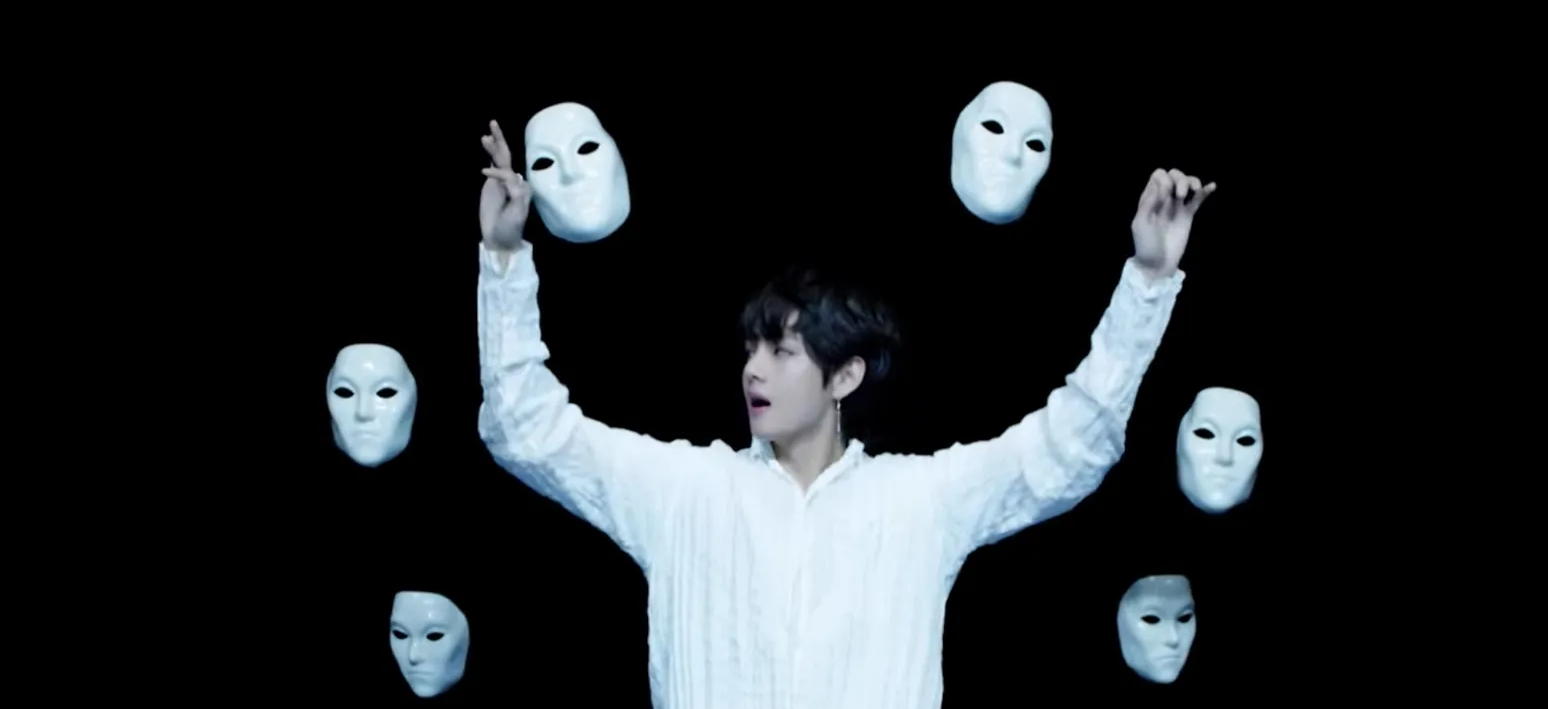(translated in 2018)
The term ‘singularity’ originates from a mathematical concept, indicating a point where properties cannot be precisely deciphered, with all equations going haywire and becoming nonsensical.
In this song, RM adopts this concept, infusing it with physical and psychological components, transforming ‘singularity’ from a point to a place (a frozen lake) and a state of mind, metaphoric as they may be, where everything is unraveling, and where he must confront what’s lurking inside. Thus, the song’s theme—the torment of a man deceiving his true self—is foreshadowed by the title.
However, the title is not the only intriguing aspect of the song. RM paints with a dark palette and abstract application of words and phrases to lend each line and verse a highly poetic and symbolic characteristic, strewn with somber imageries. In this sense, lyrically, Singularity is the most intricate song in the entire oeuvre of BTS.
Musically as well, the texture and tone diverge significantly from their usual compositions; it resides in the neo-soul genre, heavy with jazz and R&B sounds but without the hip hop and funk elements, with V’s deep and haunting voice adding to the enigmatic ambiance of the song.
Given that RM wrote the lyrics as abstract poetry, I will present my interpretation and analysis of each verse chronologically before putting my full translation of the lyrics. In this way, you can better grasp the intended meaning of each line and the narrative progression of the verses.
In the first verse, the protagonist (who also narrates), is suddenly awakened by a strange cracking sound reverberating all over his surroundings. He tries to ignore it and go back to sleep, but the sound proves too distracting. The frozen lake is not yet mentioned, but the sound is coming from there.
The lines of the whole song are steeped in symbolism, and the first verse is no exception: ‘잠 (jahm) (sleep)’ represents the state where the protagonist is living a life of lie, avoiding to confront the inner demons slowly brewing inside; ‘깨지는 소리 (ggae-jih-neun soh-lih) (cracking sound)’ that wakes him up from this state of denial marks the beginning in which he can no longer simply ignore the personal struggles that are eating at him.
Perhaps this is now happening because the relationship built on a lie is on the cusp of deterioration. He covers his ears and closes his eyes to go back to sleep (he’s kicking and screaming to return to the previous state), but the struggle is now too noticeable (cracking sound is too conspicuous) for him to brush it aside.
RM’s phrasing in this verse is superb. For instance, he employs two verb-less lines in the order of noun+adjective+noun (one e.g. “낯설움 가득한 소리 (naht-suhl-woom (strangeness, oddity, unfamiliarity) gah-deuk-hahn (rife, full of, packed with) soh-lih (sound)”) in order to heighten the sense of dread. He utilizes this style to its most potent effect in the first verse because he wants to add immediacy from the start to set the visceral tone for the rest of the song.
In the second verse, the narrator feels as if there is a throbbing pain in his throat (we find out from the later verses that this pain is imaginary, a phantom pain). This is not a new sensation, as he has previously experienced it. It’s an insidious pain that has been slowly building and coming more frequently (“목이 자꾸 아파와 (mohk-ee jah-ggoo ah-pah-wah) (I’m getting frequent throat pain)”).
On a side note, in the official MV, the translation of this line on YouTube goes like this: “The pain in my throat gets worse.” This is incorrect, for the pain is happening more frequently, not getting worse. If RM wanted to articulate that the pain is getting worse, then he would have written “목이 더 아파지고 있어 (mohk-ee duh ah-pah-jih-goh itt-(s)uh),” but RM uses the adverb ‘자꾸 (jah-ggoo),’ which means ‘often, frequently, again and again,’ not ‘더 (duh) (more, farther, further).’
The correct translation is important in this case because the imaginary pain in the throat here refers to the struggles brewing inside of him, which he desperately attempts not to confront (“감싸보려 하지만 (gahm-ssah-boh-lyuh hah-ji-mahn) (Though I try to protect it (throat) (lie)).”
However, he can no longer ignore it, as the cracks have started to form in his life of lies. Yet, he cannot even articulate his inner demons because he has now lost the ability to speak the truth (“나에겐 목소리가 없어 (nah eh-gehn mohk-soh-lih gah uhp-(s)uh) (I have lost the ability to speak)”), perhaps this is why the part of his body that is experiencing the painful sensation lies in his throat.
In the third verse, the cracking sound continues to haunt him, nearing him to the place of singularity: the frozen lake (the state of mind where all is unraveling). The fissures in the lake are forming to reveal something inside—in this case, the inner demons of the protagonist—for he had abandoned his true self and surrendered his voice for his lover (“그 호수에 내가 날 버렸잖아 (geu hoh-soo eh nae-gah nahl buh-lyut-jjahn-ah) (I am the one who relinquished my real identity)” and “내 목소릴 널 위해 묻었잖아 (nae mohk-soh-lil nuhl wee-hae moot-uht-jjahn-ah) (I decided to conceal my true self for your sake).”
The latter is an exceptional line by RM: He combines ’목소릴 (mohk-soh-lil) (voice)’ with ’묻었잖아 (moot-uht-jjahn-ah),’ which derives from the verb ‘묻다 (moot-dah) (to bury),’ to underscore the length to which the protagonist has gone to earn the affection of his lover.
In the fourth verse, reminiscent of Edgar Allan Poe’s style, the narrator is resolute in his refusal to confront the truth. This determination leads to the lake freezing over with an even thicker layer of ice. To put it less metaphorically, his reluctance to discover what lies beneath—the true essence of himself within the singularity (the frozen lake, which represents a chaotic state of mind)—has intensified.
But it’s all in vain. Even when he is asleep (the relatively stable state of mind), the pain in his throat (the brewing inner struggles), imaginary as it may be, which appears in his dream, remains to torment him. The last two lines in this verse are my favorites: “잠시 들어간 꿈 속에도 (jahm-sih deul-uh-gahn ggoom sohk-eh-doh (Even during a fleeting dream in my sleep)” and “나를 괴롭히는 환상통은 여전해 (nah leul gwe-rohp-hee-neun hwahn-sahng-tohng eun yuh-juhn-hae) (the tormenting imaginary pain still haunts me).” These expressions are quite beautiful and poetic, fully displaying RM’s writing talents.
In the fifth verse, the protagonist, now realizing he can no longer afford to keep his inner demons hidden, is grappling with the consequences of his actions. He asks himself whether his heretofore life of deceit in which he concealed his true self has led him to lose his identity completely or helped him to gain the affections of his craved lover. To find the answer, he runs to the lake in a sudden dash and sees his face inside of the lake.
In the cryptic sixth verse, the face that the narrator sees on the frozen lake is not the reflection of his face, for thick ice is non-reflective. Again, the frozen lake serves as the metaphor for the place of singularity, the psychological state of mind in which everything is going haywire, and he must confront his old true self. The fact he can observe his face inside of the frozen lake is an indication that now he can see through the lies (thick ice) to find his former, authentic self that was hidden under the lies.
However, although the protagonist has finally reached a state where he has come to grips with all his deceits, instead of making some sort of reconciliation with his former self, he still wants to turn away from the truth. He tells his true self, hidden under the ice (lies), to be quiet as he reaches to cover its mouth (“부탁해 아무 말도 하지 마 (boo-tahk-hae ah-moo mahl doh hah-ji mah) (I beg you to not utter anything)”) and “입을 막으려 손을 뻗어보지만 (ihp-eul mahk-eu-lyuh sohn eul bbuht-uh-boh-jih-mahn) (Though I try to cover its mouth with my extending hand),” in which he is actually covering his own mouth (in other words, he is telling himself to forget about this and just go on with his life of lie as usual).
However, despite his wanting to cover the truth, he knows that the spring will eventually come to thaw the frozen lake, and the ice will melt and flow (he can hide for a little while, but he cannot run from his predicament forever).
In the final verse, he understands the inevitable moment of singularity where all his lies will be exposed and come back to bite him, toppling everything he has built up to this point. Before that unraveling moment, he attempts a last introspection of his past actions in light of his current situation. As I’ve mentioned above that the word ‘목소리 (mohk-soh-lih) (voice)’ in this song connotes ‘truth.’ He asks himself whether the lie that has taken over his voice (true self) was worth it; he feels a regret that maybe he should not have abandoned his real identity just for the sake of love.
Moreover, he asks himself if even the tormenting phantom pain is a result of his living a life a lie, then what course of action he should have taken. The song ends with a poignant last line: “그때 내가 무얼 해야 했는지 (geu-ttae nae-gah moo-uhl hae-ya heht-neun-jih) (What course of action I should have taken then?”). Here, the protagonist is wondering whether he should not have sacrificed himself no matter how much he craved the affections of his lover or whether it was justifiable in the name of love, even if the relationship would eventually deteriorate from the toll that resulted from his living a life of lie.
Thus, this sublime poem ends with the protagonist in the throes of singularity, second-guessing himself and heading towards the inevitable moment where everything around him will crumble, including his relationship with the lover.
Lyrics:
Verse 1:
A strange cracking sound
Stirring me from sleep
Odd sound reverberates all around
Covering ears but can’t return to sleep
Verse 2:
Throat throbbs again with pain
I tried to cover my neck
But I’ve lost the ability to speak
I hear that sound again
Verse 3:
That sound is reverberating again
Ice cracks appearing again in frozen lake
It’s the lake where I’d abandoned me
Where I buried my voice for your sake
Verse 4:
On the lake where I’d abandoned myself
Solid ice has formed on the surface
Even in my fleeting dream there remain
The tormenting phantom pain
Verse 5:
Have I lost myself?
Or have I gained you?
I run to the lake in a sudden dash
There I see my face inside
Verse 6:
I beg you to not speak to me
I stretch my hand to cover the mouth
But Spring will come eventually
The ice will melt and flow away
Verse 7:
Tell me, if my voice is not real
Should I have not abandoned myself?
Tell me, if even this phantom pain is not real
What course of action I should’ve taken then?

